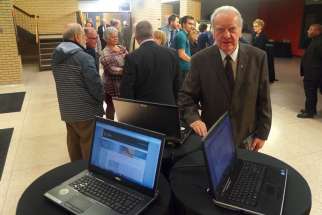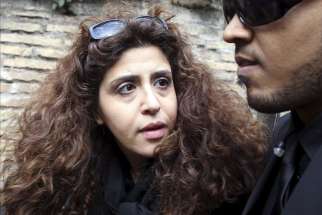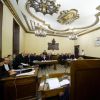Vatican’s vast archive opens new door to Canadian history
OTTAWA – Newly released digital inventories of Vatican documents have revealed fresh insights into Canadian history, but don’t expect the kind of dramatic revelations that would fill a Dan Brown mystery novel, says an Italian specialist.
VATICAN CITY – A former consultant to a pontifical commission vehemently denied giving private documents regarding the Vatican's financial reform to two journalists.
Police testify papal butler's apartment crammed with documents
VATICAN CITY - Vatican police officers who searched Paolo Gabriele's apartment testified they found "an infinite amount" of documents and news clippings covering a vast range of topics, including the Masons, the Vatican bank and yoga.
Although they sequestered 82 moving boxes full of materials, once the police inspected all the paper, only a fraction of the material was deemed relevant to the case, officers told a three-judge panel on the third day of the "VatiLeaks" trial.
Vatican judges said they would hear closing arguments Oct. 6; a verdict was possible the same day.
Each of the four police officers testifying Oct. 3 also said they did not wear gloves during the search, saying that was not the usual protocol for conducting a search and seizure of paper.
In the court's brief morning session, the four officers testifying were Stefano De Santis, Silvano Carli, Luca Bassetti and Luca Cintia, vice commissioner of the Vatican police force.
The four men were among the officers who conducted the search of Gabriele's Vatican apartment May 23 and arrested Gabriele that evening. The officers were among eight witnesses all called by the defense to testify in the trial of the former papal assistant, who has been charged with aggravated theft for allegedly stealing and leaking papal correspondence and other sensitive documents.
Gabriele was present in the courtroom during their testimony.
Each officer took the stand while his colleagues waited outside. Each of the officers was asked to describe how the search was conducted, which officers searched which rooms of Gabriele's Vatican apartment and what was found where.
The search started just before 4 p.m. and ended close to midnight. De Santis said he suggested to Gabriele that it would be better for his wife and children, who were home at the time, to leave for awhile because the potentially disturbing event "would be engraved in their memories."
Gabriele declined, and he, his wife and three children stayed in the apartment during the search.Two of the officers were called only later to help with the search. Even while other officers continued to go through Gabriele's home office, the two were asked to check the children's rooms for potential material and to do it quickly so the children could go to bed.
De Santis said the officers also told Gabriele he should phone a lawyer, and he immediately called Carlo Fusco, his childhood friend. Fusco left the defense team in August, saying he and Gabriele had irreconcilable differences of opinion about defense strategy.
The officers said that during the search Gabriele said, "See how much I like to read and study?" But he also apologized that the amount of material in his house "will keep you at work late," and he offered them coffee and water.
Gabriele was taken into police custody around 8 p.m.
In his testimony, De Santis said he realized the seriousness of the alleged crime when they discovered materials matching those leaked to an Italian journalist, who had published them in a book.
"At that point we decided to take away everything" that looked remotely related, and they alerted the head of the Vatican police corps, Domenico Giani.
Highly sensitive materials, including encrypted cables from Vatican nuncios, were "well-hidden" among piles of paper stuffed in cabinets, shelves and ceiling-high closets, he and the other police witnesses said.
Gabriele allegedly leaked a large number of sensitive documents to an Italian journalist who published them in a book early May. De Santis testified that the publication of even one of the coded and deciphered cables could have compromised the Vatican encryption system.
Only a small fraction --"more than 1,000 pages" -- of the materials was determined to be relevant to the case, Carli testified. Some of that material involved information about the private life of the papal household, letters from cardinals to the pope and written replies from the pope. Some documents with the pope's signature were marked in German, "Destroy," two of the officers testified.
The majority of the documents were pages printed off the Internet and news clippings covering a vast array of topics. Gabriele's lawyer, Cristiana Arru, questioned each officer about how much material was found in the apartment and where it had been discovered. In addition to the 82 boxes -- each measuring about 15 inches by 23 inches -- police carried away two black leather suitcases and two "big yellow bags" filled with materials.
Arru told reporters after the hearing that she wanted to show that it was physically impossible for that amount of material to have been in Gabriele's home.
Arru was rebuffed by the main judge, Giuseppe Dalla Torre, when she continued to ask the police whether they were present at the search of Gabriele's quarters at the papal summer residence in Castel Gandolfo. Dalla Torre said repeatedly that the results of the Castel Gandolfo search were not relevant to the case because a Vatican tribunal's jurisdiction only covers crimes committed in Vatican City State.
Police also confiscated one desktop computer, two or three laptops, "many" USB memory pen drives, one iPod, two hard disks and a PlayStation from Gabriele's Vatican apartment, police said. De Santis said police still have not finished examining all of the information on the computers.




